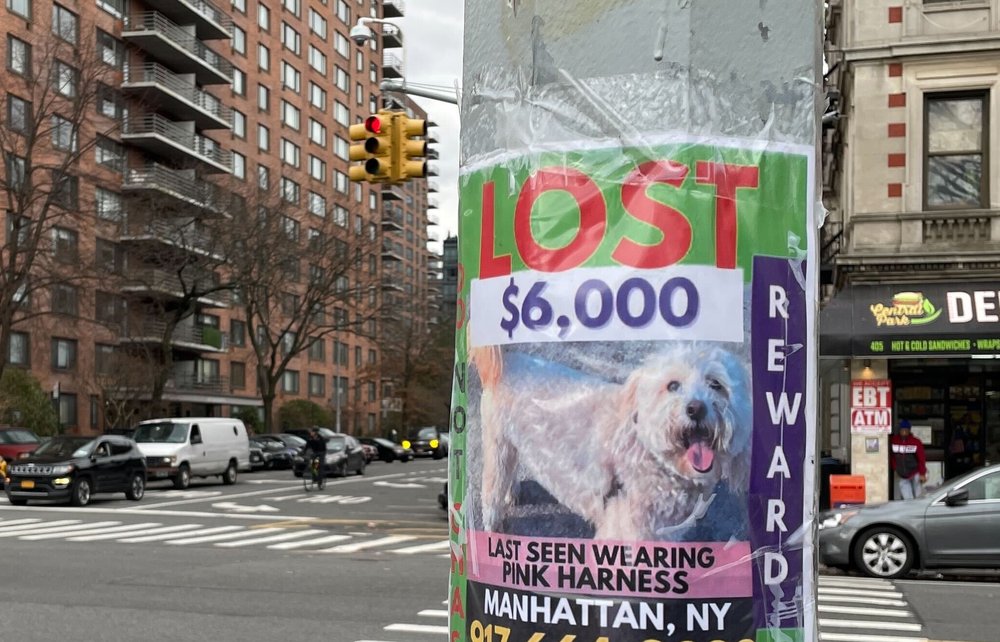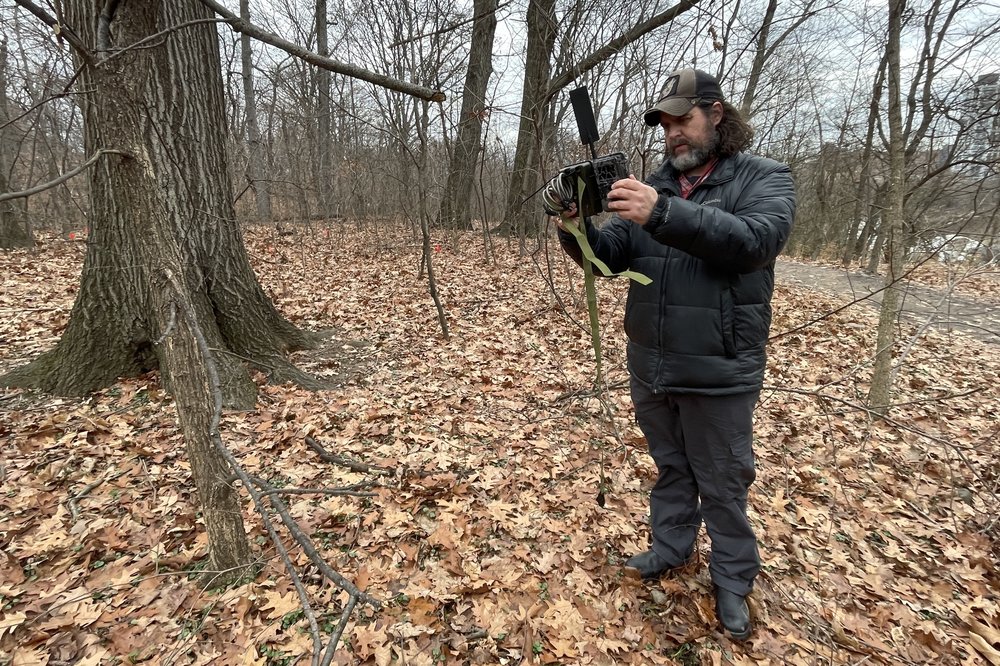How the $20K search for a missing dog on the Upper East Side sparked an internet firestorm
Jan. 12, 2024, 1:08 p.m.
Rosie the mini-doodle has been lost since November. After a GoFundMe campaign raised nearly $20,000 to fund the search, her owner became the target of internet vitriol and hate speech.

A mini-goldendoodle named Rosie is missing on the Upper East Side, and a GoFundMe campaign has raised $19,458 to find her as of Friday morning.
Areas around Central Park, where Rosie went missing over Thanksgiving weekend, have been blanketed with flyers advertising a $6,000 reward.
The story gained the attention of Lucy Wong, a New York-based TikTok user with more than 70,000 followers, who posted a video about the situation earlier this week.
“I need to talk about the drama that’s been plaguing my neighborhood,” she began, adding that issues get “a little more dramatic” on the Upper East Side because “people kind of have Upper East Side money.”
In her video, Wong repeated details from local Facebook groups about the lost dog and the money raised to help Shira Meged, the dog’s owner, in the search. She noted that the GoFundMe was trying to raise thousands of dollars and described it as “an absurd amount of money.”
Unsurprisingly, given the combo of “wealthy neighborhood” and “pet drama,” the internet lost its mind in response to Wong’s video.
As the comments poured in to TikTok, the story became a litmus test for people’s values, with commenters weighing in on the search effort, the sum of money, how far one should go to find a lost pet, and the Upper East Side in general.
“I lie awake at night thinking about how this is crazy as rich people’s lives get,” said one TikTok commenter.
Wong did not respond to multiple requests for further comment and said only that she would “prefer not to be the face of this story.”
But some of Wong’s claims, including how the money was being used and the kind of professional pet tracker Meged hired, were inaccurate, Meged said.
Meged, a therapist, has said on her website that “no monies raised have gone or will go to lost wages” – and the web page for the GoFundMe campaign states that they are applied toward hiring a professional pet tracker, the reward for information and toward the search effort, to fund things like transportation or flyers.
She also denied Wong’s claim that she hired a “psychic” pet detective to find her dog.
Meged did hire Jim Tierney, who describes himself as “an intuitive pet tracker/animal communicator” on his Instagram. She said that he was relying on technical and physical skills to find Rosie.
On Wednesday, he was in Central Park continuing the search.
Tierney set up an array of 22 motion-sensor cameras across Central Park, where the dog was last seen, and baited them with rotisserie chicken and liquid smoke, an industrial barbecue flavoring ingredient.
After reviewing the footage to look for the lost animal, he returns to move the cameras to new locations and try again.
Tierney said he only relies on “clairvoyance,” when there’s nothing else.

“Ace Ventura is real”
A few commenters on Wong’s TikTok sympathized with Meged’s plight, saying they’d go to any lengths for their own animals. Many said they’d seen lost pet rewards and fundraisers that struck them as high elsewhere in New York and in other parts of the country.
Many more weighed in that the fundraiser was a scam, that the dog was long gone, that “Ace Ventura is real.” Most of the outrage was directed toward the sums of money involved. The story was picked up by the New York Post, PIX11, and multiple local blogs and outlets.
“People are allowed to have any reactions or feelings that they want,” Meged said in an interview at her Upper East Side walkup, four days after Wong’s video was posted. She was joined by two friends, who she introduced as having met when they joined the search for Rosie.
“I am privileged to be where I am right now and I can acknowledge that,” she said. “At the same time, Rosie’s my family, and I miss her, and I want to bring her home.”
Still, she said that finding herself in the digital spotlight all of a sudden was tough.
“I am not someone who's comfortable being so public,” she said, adding that her social media accounts had been private until she tried to find Rosie. “Having so many people have insight into my life is really hard."
“The fact is there’s so much cruelty online today, it’s despicable.”
Krista Thomason, a professor of philosophy at Swarthmore College who has written extensively about online shaming and schadenfreude, says the internet invites us to slot people into categories and caricatures that become fair game for mockery.
“People make the distinction online between punching down and punching up,” Thomason said. “People have convinced themselves it’s perfectly alright to be mean to someone because they appear to occupy an elite social class.”
After the story took off online, Meged, who included her contact information on the flyer, became the target of hate speech.
Screenshots shared with Gothamist show text messages filled with misogynistic language telling Meged to kill herself, calling her lazy and ugly, inviting her to sexual activities and questioning whether her lost dog was even real. One message included antisemitic language; a TikTok comment calling her a “con artist” posted her home address and monthly rent.
“I’ve had people say that they have my dog and are ready to kill her, that the dog’s already in Chinatown, people who threaten my life, saying we know where you live and we can come and hurt you if we want to,” Meged said.
Sue Scheff, author of “Shame Nation: The Global Epidemic of Online Hate,” said she’s exhausted by the amount of stories like this she encounters.
"People email me all the time, ‘Oh this online shame, oh that online shame,’” she said. “The fact is, there’s so much cruelty online today, it’s despicable.”
Scheff said the Upper East Side tale, and its inaccuracies, are ripe for going viral.
“The top reasons things go viral: politics, religion, and pets,” Scheff said.
Thomason, the Swarthmore professor, who described herself as a dog owner and animal lover, said a growing category of online backlash is against the “precious pet parent,” who is sometimes perceived as being overly attentive of their animals.
Meged, who works as a psychotherapist and trauma specialist, said she can’t help but apply her professional lens to the onslaught of hate speech.
“People have their own trauma and their own pain and react from that space,” she said.
She said that, ironically, the outpouring of initial support from neighbors, GoFundMe donors, and online supporters helped the story get the level of attention where it was ripe for backlash.
“People show up every Saturday at our flyer meetups to hang flyers with their children, with their families, with their dogs,” Meged said. “The amount of people showing up is making it more visible – that’s a really great thing in many ways, and it’s hurting in other ways, too.”
Meged took to her own social media to invite Wong to “put down her phone and help put up flyers.”
“I’m sure she didn’t intend to cause any pain,” Meged said of Wong’s video. “But intent does not equal impact, and I think people really need to stop and think before they speak – especially into the void, especially on social media.”
This bench at Newark International Airport just won an architectural design award People are losing it over this $10 hot chocolate on the Upper East Side, so I tried it. Why the Whitney Museum went from 'pay-what-you-wish' to 'free' on Friday nights